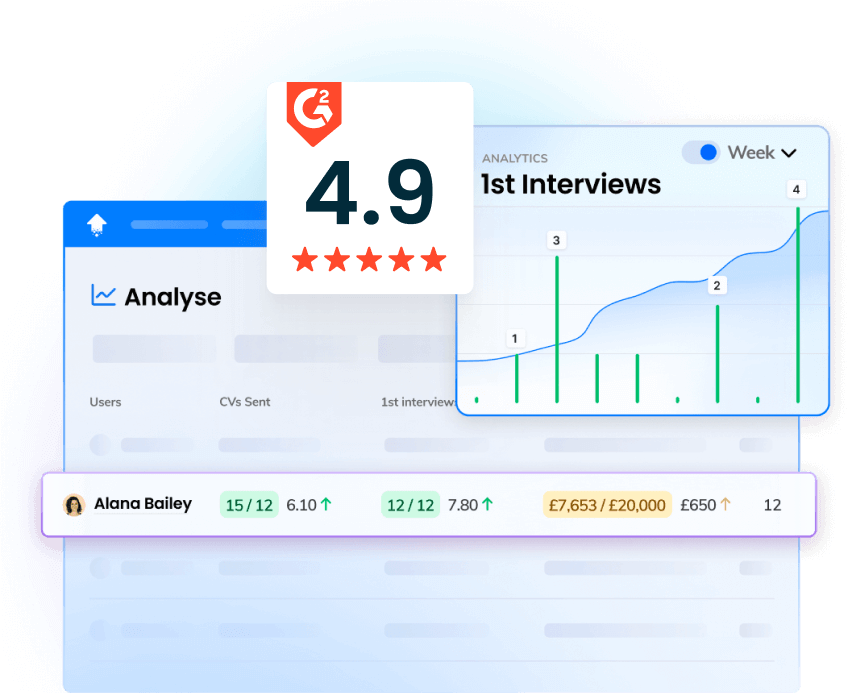Gamification is when typical game-playing elements, such as levelling up, collecting points, or competing with others, are applied in a corporate setting.
So what is gamification in recruitment?
Gamification in recruitment has two distinct use cases:
- Improving the performance of your recruitment team
- Improving the candidate's experience
In this guide, you’ll discover 19 useful gamification tools that work at various stages of the hiring process. We’ll also take you through the benefits of gamification, how to implement it, and how to balance competition and collaboration through gamification.
Enhancing Recruitment Team Dynamics with Gamification
If your recruiters feel a bit unmotivated, or you want to spur your team on to hit their goals, gamification is an incredibly useful tool to have in your arsenal.
Here’s why.
1. Driving Team Competition
Gamification in hiring is used, first and foremost, to drive healthy team competition.
Games are, by their very nature, competitive — making gamification tools with built-in incentives extremely useful in this pursuit.
Think about it.
Are you going to have a more motivated day in the office if you simply sit down in the morning with your usual workload ahead of you — or if your tasks, goals, progress, and achievements are displayed side-by-side with those of your colleagues on a gamified display?
Here’s a basic recruitment gamification example. Say one of your annual team goals is cutting your average ‘time to fill’ by one week. Simply set up a gamified competition on your team leaderboard and announce that the recruiter with the fastest ‘time to fill’ metric will receive a prize.
The leaderboard should clearly show the goal and each recruiter’s progress towards it.
Include milestones towards that goal within the visualisation and set up automated celebrations when each recruiter hits each milestone.
Many tools will also allow team members to collect badges or points when they hit certain milestones, or level up after achieving their latest goal — amping up the peer-to-peer competition.
This should help you hit your overall team ‘time to fill’ goal way before you would have without gamification recruitment tools.
2. Encouraging Collaboration
Gamification can encourage collaboration in much the same way that it fosters healthy competition.
Instead of setting up competitions between individual recruiters, set a team goal and track the team’s overall progress toward hitting this goal. The dashboard should also allow the team to delve into individual performance so it is clear who is leading the team, and who is struggling. This should encourage peer-to-peer coaching, and inspire hard work.
You can also gamify team communication — to inspire collaboration — with tools that allow likes, comments, personalised memes, and in-chat celebrations.
3. Breaking Huge Projects Into Manageable Segments
When you’re staring down the barrel of a massive project, it can feel overwhelming.
By breaking projects down into milestones or levels for your team via gamification tools, you can make the workload feel a lot more manageable — and ensure no details are missed.
4. Providing a Roadmap To Hit Goals
You know what goals your team needs to hit — and you know what your recruiters are capable of.
The question is always: how do you get them there?
Through the gamification of the hiring process, you can provide a clear, illustrated roadmap to hitting those goals, broken down into manageable milestones.
5. Developing Better Candidate-Recruiter Relationships
Gamification doesn’t just work for recruiters.
Much of the candidate experience can be gamified too, from screening and assessment to interviewing and onboarding.
Gamifying the hiring process boosts the candidate experience, making it more seamless and enjoyable for job seekers.
Meanwhile, the automation that is baked into a gamified candidate means your recruiters get to spend less time on tedious tasks like sifting through potential candidates’ CVs, and more time supporting quality candidates.
Furthermore, gamification tools allow you to gather more targeted data about candidates, and predict job performance.
6. Making Work Fun
Gamification in recruitment makes work a lot more fun.
After all, what would you rather work with? A spreadsheet full of raw data, or a visually rich app that highlights your progress and your path to success?
When you hit an important milestone, would you rather have it pass unnoticed, or celebrate with your team?
And would you rather work in silo with other recruiters, with little idea of their performance? Or keep track of each other’s projects so you can compete and collaborate?
Implementing Gamification in the Recruitment Process
Your implementation of gamification within your recruitment workflows will largely depend on which elements of the hiring process you choose to gamify, and which software or tool you choose.
For instance, you may wish to gamify:
- Recruiter motivation and performance
- Team collaboration
- The hiring process
- The candidate experience
- Candidate screening
- Skills assessments
- Interviewing
- Employee referral
- Employee onboarding
When deciding which segments of your agency’s workflows could benefit from gamification, you must consider your current processes, pain points, and specific needs and goals.
For example, if your candidate's quality score is low against industry benchmarks, you may want to focus on gamifying screening and skills assessments.
The gamification of the screening process is often accompanied by automation, which allows you to fairly screen candidates through standardised questions, increase the volume of job applicants you’re screening, and gather and analyse more targeted data about applicants. Not to mention decreasing the tedious, repetitive screening tasks recruiters were historically burdened with.
This might look like a branded one-way video, with a set of questions to answer, or AI-powered software sifting through CVs and collating the results into easy-to-understand data illustrations.
Meanwhile, gamifying your skills assessment improves the candidate, recruitment agency, and client experience. Through gamification, you can replicate real-life work tasks to discover candidates’ hard and soft skills, and see how they would apply their competencies in a work environment.
Once you have decided on which segments of the recruitment process require gamification, consider the hard and soft skills your clients most commonly ask for — and how these could best be tested through gamification.
Now it’s time to identify the right software to achieve your aims. Many recruitment gamification software offer budget, turnkey options where you can select the best ready-to-use solution for your purposes, as well as more expensive custom game designs.
Now you’ve got the perfect gamification solution, it’s time to integrate it into your workflows and get buy-in from your team and clients.
The Impact of Gamification on Team Morale and Productivity
When implemented effectively, gamification of the hiring process doesn’t just improve the candidate and client experience — it provides a huge boost to recruitment team morale, company culture, and productivity too.
According to Mambo.io, approximately 90% of employees reported an increase in productivity after gamification was introduced into their work processes. Furthermore, gamification also resulted in an 89% surge in employee happiness.
It’s easy to connect the dots.
Games are designed to engage users and make them feel happy about achievements — that’s why so many people play them in their spare time.
By applying online games in a corporate setting, you’re making day-to-day tasks and goals feel much more exciting, and ensuring recruiters receive praise and acknowledgement for good work. This boosts productivity, as team members race to hit their next goal, and makes them feel happier when they do.
What’s more, by engendering a sense of camaraderie — that heady ‘we’re all in this together’ feeling you get when playing a game as part of a team — gamification can significantly improve team dynamics and collaboration.
Balancing Competition and Collaboration
This is nothing new.
Every recruitment team leader knows the importance of balancing competition and collaboration among their recruiters.
Too much competition? Team morale plummets, company culture dives, the office becomes an unhappy place to work, and recruiters with plenty of potential leave the agency.
Too much collaboration? That all-important competitive drive slackens, and so do your results.
Companies using gamification for recruitment will find this software can help them to manage this interplay between competition and teamwork.
If you fear your recruiters are becoming too cut-throat and refusing to help each other out to the detriment of the agency, it’s time to set some team goals.
Create a custom leaderboard toward the goal you want the team to hit — together — and track their progress as a unit. Celebrate achieving milestones as a team, and encourage peer-to-peer coaching if a few team members are struggling. Make it clear that no matter how well one or two individuals perform, the recruiters will only receive their reward if they hit the goal as a team.
On the other hand, if there’s a serious lack of hunger to succeed within your recruitment team, gamification is perfect for instilling that competitive drive.
Set up a head-to-head competition towards a goal where every recruiter is competing solo. Display the leaderboard on a prominent screen in the office, so it’s easy for recruiters to track their progress against that of their colleagues. And celebrate every time a recruiter hits a milestone.
Top Gamification Tools for Recruitment Teams
There is a wide variety of gamification recruitment software at all stages of the hiring journey.
Here we take you through 19 of the top gamification recruitment tools to use in 2024.
Gamification Tools for Recruiter Motivation and Performance
1. OneUp
OneUp is a leading recruiting analytics software with outstanding gamification features designed specifically to motivate recruitment teams.
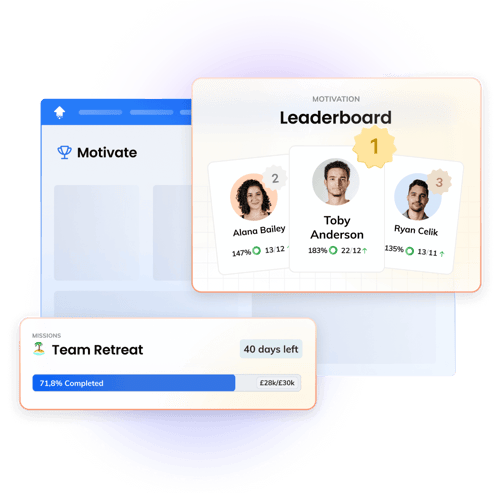
Recruitment leaders can set team or individual targets and use custom dashboards to track progress towards these targets. What’s more, they can set up leagues to show reps their progress against peers, start challenges between individuals or teams to foster healthy competition, create missions, and incentivise your team to work together to smash targets. Finally, celebrate success and great work with your team — OneUp even supports individual celebration anthems.
It’s also easy to share leaderboards and display them on screens in the office to keep your team up-to-date with what top performers are achieving.
2. Centrical
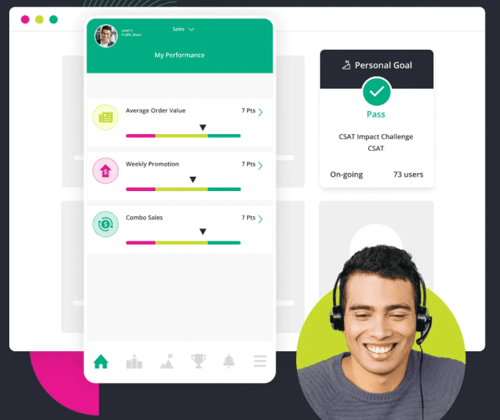
Centrical promises to level up employee gamification. This software uses exciting game narratives — for example, car races and ‘hike and seek’ — to engage employees with their goals. Users collect points, redeemable coins, and badges as they move up the leaderboard, and level up for hitting milestones. Centrical also facilitates team competitions and individual challenges — and it’s easy to acknowledge success with both manager and peer kudos. Users can also earn special points for sharing tips and tricks, while teammates can upvote contributions.
Gamification Tools for Team Collaboration in Recruitment
3. TeamTailor
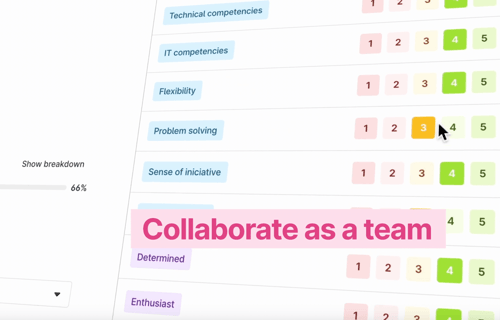
Collaboration is at the heart of the TeamTailor platform. Team members are given a shared overview of progress, and are all able to review and rate candidates within the process. They are also able to tag colleagues on specific candidate cards — social media style — enhancing communication.
4. Trakstar Hire
Trakstar Hire is a collaborative recruitment software that allows team leaders to create and delegate tasks, and coordinate with their team to screen candidates, schedule interviews, and make hires. Candidate profiles can be shared with team members, and notes and evaluations are collated all at one central location. Calendar integration helps managers coordinate schedules.
Hiring Process Gamification Tools
5. Spinify

Spinify gamifies the recruitment process with real-time leaderboards that allow recruiters to track their progress towards individual, group, and team targets. Set competitions, and reward teams with points and badges. This software also facilitates automated celebrations with personalised songs, virtual gongs, personalised memes, and motivational messages.
6. Jobvite
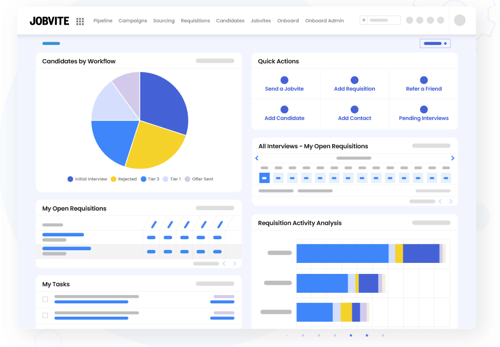
Jobvite streamlines talent acquisition across the whole job cycle. Features include custom analytics dashboards that combine hiring and performance data to measure the quality of new hires. It also facilitates peer benchmarking. It gamifies the candidate referral process, with automated rewards and incentive management targeting existing employees within your client companies. You can track employee engagement campaigns, referral bonuses, probation periods, and referral ownership.
Candidate Experience Gamification Tools
7. The Talent Games
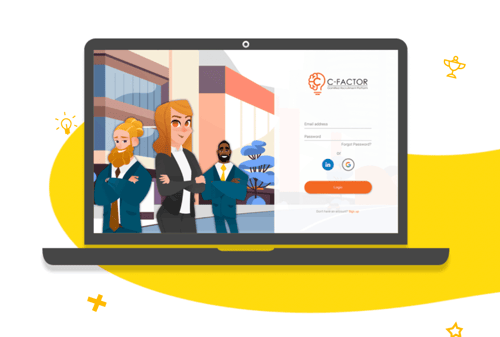
The Talent Games delivers fun ready-to-play games designed for cost-conscious brands who want to update their candidate experience and gather the data that will help them hire top talent. Introduce candidates to AI-powered pre-interview assessments that are scientifically proven to accurately evaluate their aptitude, cognitive ability, and behaviour. Alternatively, choose a custom-built game that boasts a tailored storyline and artwork and customised assessments based on unique competency models. Both options work on an unbiased algorithm to reduce bias during the recruitment process, and an unlimited number of assessments.
8. Equalture
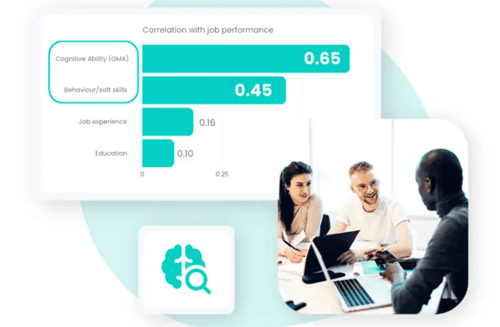
Equalture promises “an unforgettable candidate journey” through its innovative and inclusive game-based approach. Instead of answering questions or completing tests, candidates are tasked with hitting goals and completing missions. Its game-based assessments are designed to mirror real-world behaviour and observe unconscious candidate behaviour.
Candidate Screening Gamification Tools
9. Canditech
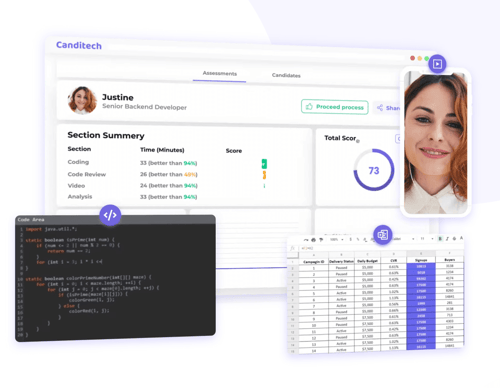
Canditech offers skills assessments, video interviews, and pre-screening chatbots that aim to empower recruiters to make hires based on job performance predictions. Its all-in-one screening platform assesses specific job-related skills as well as soft skills, cognitive abilities, and personalities, while gamified job simulation assessments are a useful predictor of future performance.
10. Owiwi
Owiwi transforms the recruitment process into a captivating game. Candidates are taken on an immersive journey through a series of compelling choices. This is designed to reveal key aspects of their character and soft skills. The gamified process measures accountability, adaptability, decision making, willingness to change, integrity, learning agility, resilience, teamwork, project management, entrepreneurship, and people support.
11. Test Gorilla
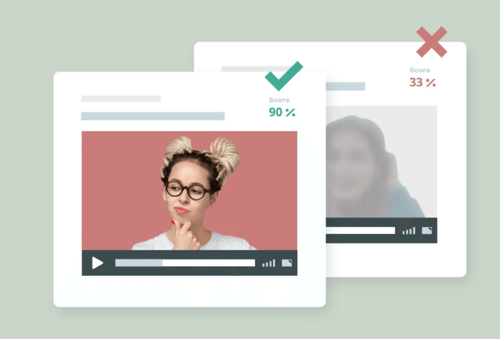
TestGorilla automatically grades and ranks candidates based on expert-certified test scores. With a library of 401 scientifically validated tests to choose from, recruiters can screen candidates for job-specific skills such as coding, and softer skills such as critical thinking. Meanwhile, personality and value tests help you to find out who your candidates are.
Skills Assessment Gamification Tools
12. Pymetrics
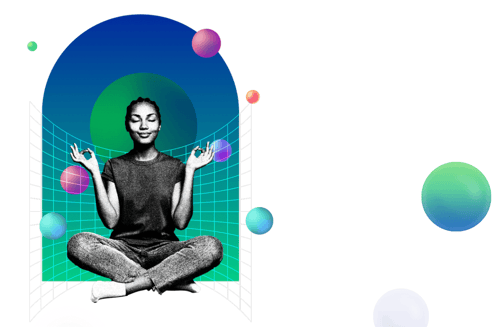
A soft skills platform with a difference, Pymetrics uses data-driven behavioural insights and audited AI to create an effective, efficient, and fair hiring process. Gamified behavioural assessments are employed to collect objective cognitive behavioural and cognitive data from candidates to measure their true potential. These games include numerical and logical reasoning, and capture thousands of data points to build a candidate profile. Recruiters can also build unique bias-tested algorithms for each client based on what the company defines as top talent.
13. Toggl Hire
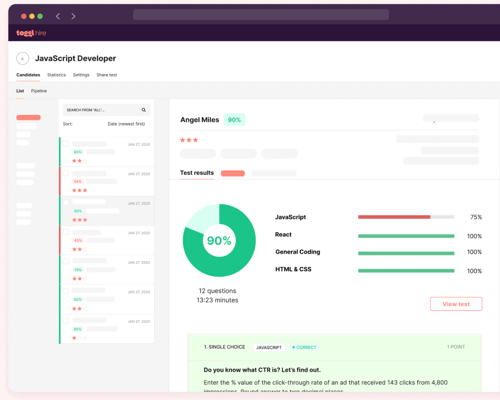
Toggl hire offers recruiters the chance to thoroughly screen skills rather than CVs. Candidates apply via a gamified quiz-style assessments that evaluate the skills needed on the job. The scoring system then shortlists top performers. What’s more, Toggl offers a vast library of ready-made quizzes for a wide variety of specific roles, from Financial Controllers and Lead Javascript Developers to Information Security Analysts and Content Strategists.
Interviewing Gamification Tools
14. HireVue
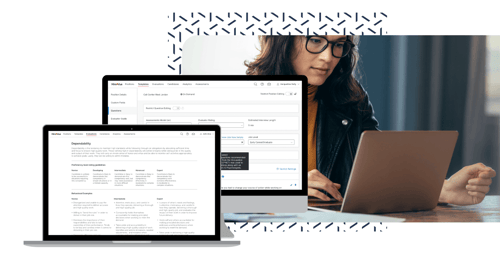
Structured interviewing tool HireVue empowers recruiters to build out an automated video interview process. Within the interview, they can leverage their own competencies, questions, and evaluations, or use those provided by HireVue. Recruiters can then assess candidates with evaluation guides that are built into the interview experience. They are also provided with job-related attributes and behaviour examples validated by occupational psychologists to boost the selection process.
15. myInterview
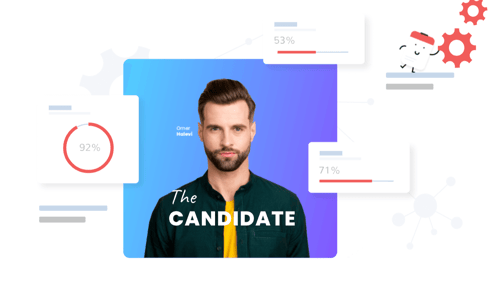
myInterview gamifies the interview process from both the candidate and recruiter perspective. First off, the candidate films a one-way video, responding to questions set by the recruiter. Recruiting teams can then review the videos together and shortlist candidates for live interviews from the platform too. You can add personalised video introductions, comment and rate submissions, and share interviews with clients’ hiring managers.
Employee Referral Gamification Tools
16. Boon
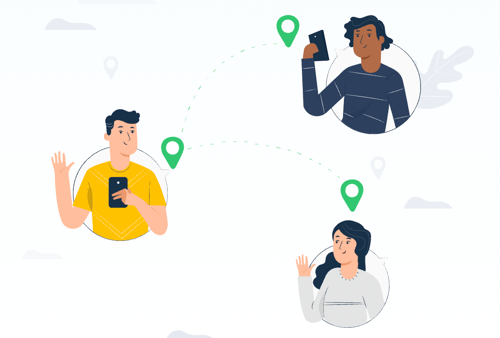
Boon gamifies the referral process with compelling incentives, customisable templates, and automated payment tracking. Available on both mobile and web, this platform delivers an automated and engaging experience for clients’ employees. A smart dashboard allows you to visualise, track, and analyse the growth of your referral program to see ROI.
17. Radancy
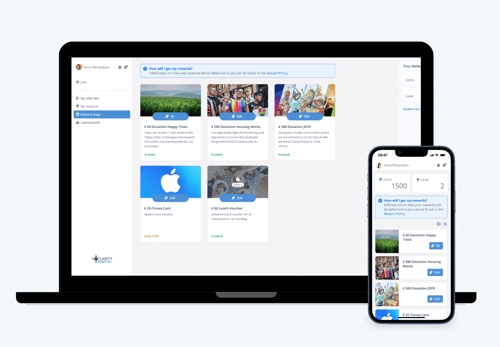
Employee referral platform Radancy aims to maintain high employee engagement through gamification. It encourages active engagement among employees with friendly competition, driven by a transparent reward system. This is based on leaderboards that recognise and incentivise employees for their referrals.
Employee Onboarding Gamification Tools
18. EdApp
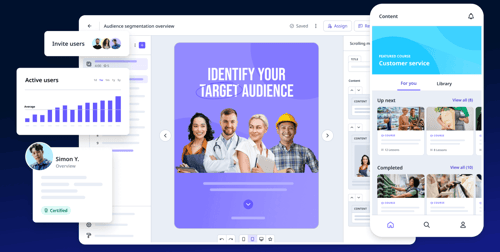
Need to optimise your onboarding process? HR gamification software EdApp takes new employees through every stage of the training process, with both branded, ready-made courses and custom courses available. Gamified, bite-size courses ensure employees directly interact with new information, and there are 80+ gamification templates to ensure new hires are engaged from day one. Furthermore, AI capabilities make creating custom courses quick and easy.
19. Seppo
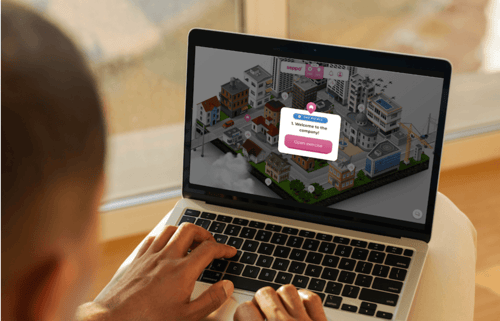
Seppo promises a gamified onboarding experience that is engaging, effective, and fun. The software offers a selection of ready-made games and templates for corporate use that can easily be tailored to your client’s onboarding requirements. Simply copy the game and then change the theme, game board, and tasks to fit your purposes. Turnkey projects are also available. Seppo delivers solutions for different stages of the onboarding process, including pre-onboarding, general onboarding, work environment onboarding, and role-specific training.
Final Thoughts on Using Gamification to Motivate Recruitment Teams
As we’ve discussed, gamification is an incredible tool for motivating your recruitment team — as well as for improving the candidate journey.
Benefits are wide ranging, from driving competition and collaboration to boosting productivity and recruiter morale.
Meanwhile, a smoother, more in-depth, and gamified candidate journey leads to better data-driven decision making and significantly improved outcomes for recruiters, agencies, and clients.
Remember, it’s essential to consider your goals and pain points and define vital candidate skills before choosing the right gamification software for your needs.
Leading recruiting analytics software OneUp is an outstanding tool for introducing gamification into your recruiters workflows. Display real-time leaderboards, create competitions amongst teams or individuals, and celebrate success with personal anthems.




